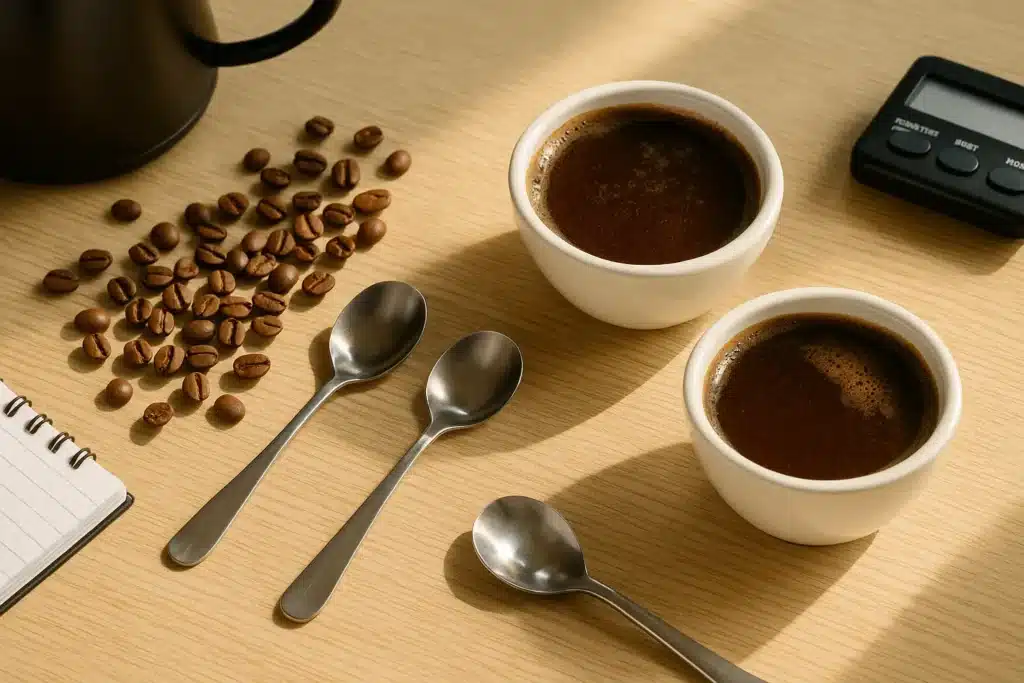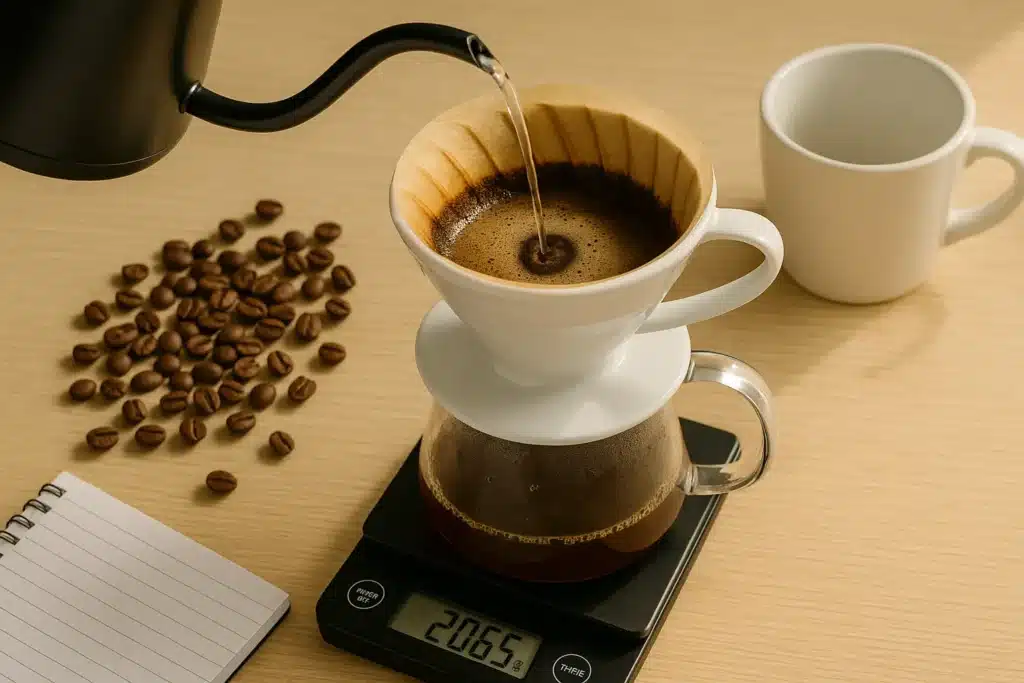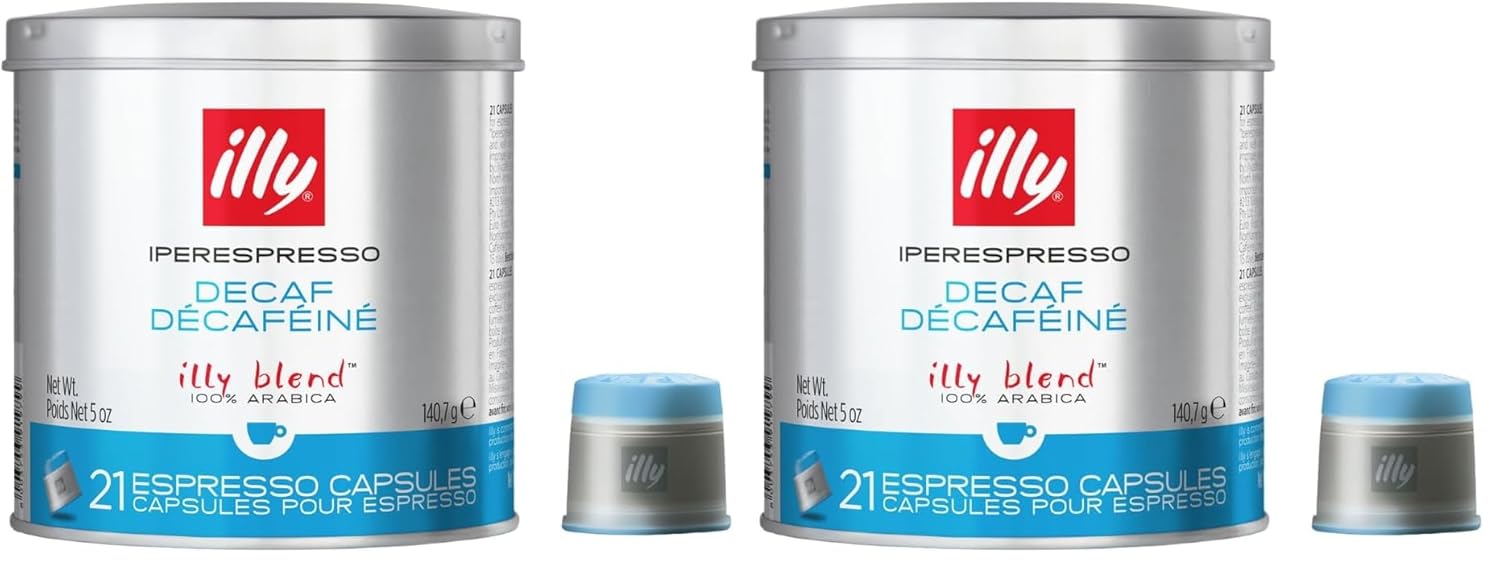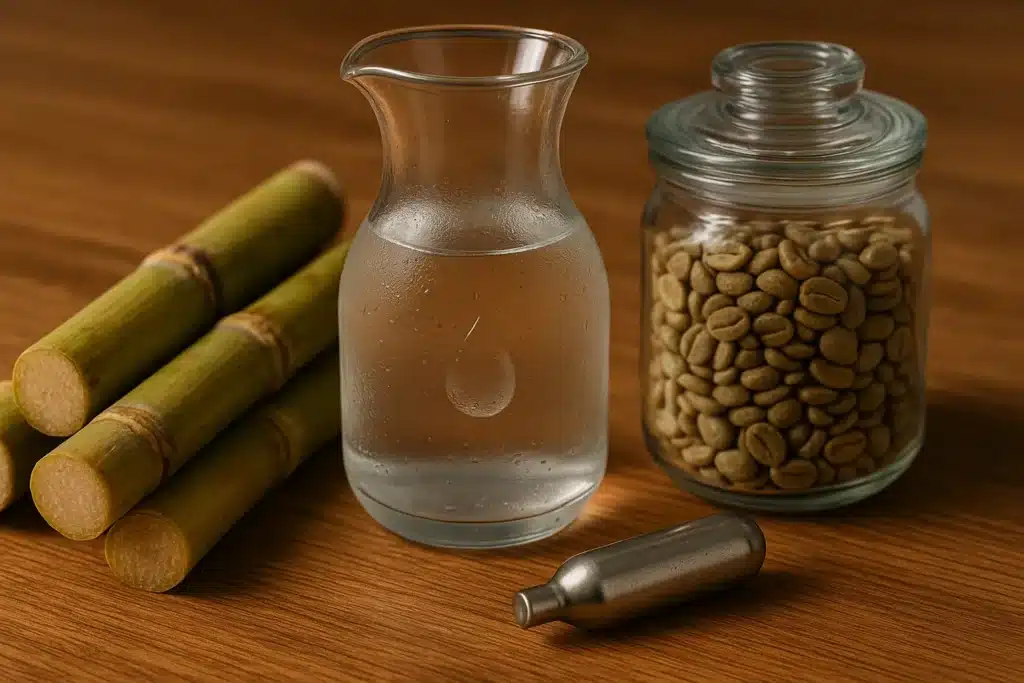
OneHundredCoffee is reader-supported, and some products displayed may earn us an affiliate commission. Details
If you’ve ever sipped a cup labeled decaf and thought, “Hmm… something’s different,” you’re not imagining it. Decaffeinated coffee can taste different—but not in the one-size-fits-all way people assume. As someone who cups coffee for work (and, let’s be honest, for fun), I’ve run side-by-side tastings of regular and decaf beans from the same roaster, dialed in espresso shots with both, and even brewed blind for friends to see if they could tell. The verdict? Sometimes decaf is indistinguishable from regular. Sometimes it’s a touch flatter, or sweeter, or less bright—the why behind that difference is fascinating—and completely manageable once you understand the variables.
Our Favourite Best Reviewed Decaffeinated Beans
| Image | Product | Features | Price |
|---|---|---|---|
 | Price on Amazon | ||
Best Budget  | Best Budget
| Price on Amazon | |
Best Overall  | Best Overall
| Price on Amazon | |
Best Price  | Best Price
| Price on Amazon | |
Best Quality  | Best Quality
| Price on Amazon | |
 | Best Decaf Coffee
| Price on Amazon | |
Best Price  | Best Price
| Price on Amazon |
This deep dive is your friendly, no-jargon guide to decaf flavor: how decaffeination works, how roast level and freshness matter, how to brew decaf that shines, and how to choose beans that taste like the coffee you love—minus the jitters.
Quick Take: Does Decaf Taste Different?

Short answer: It can, but it doesn’t have to.
Long answer: The taste of decaf depends on (1) the decaffeination method, (2) the quality and freshness of the green beans, (3) the roast profile, and (4) how you brew. Modern decaffeination can be remarkably gentle, preserving most of the aromatic compounds. If you start with good beans and brew for slightly higher extraction (more on that soon), you can get a cup that’s surprisingly close to regular coffee in body, sweetness, and complexity.
Why decaf might taste “different”: the science in plain English
Coffee flavor comes from a huge range of compounds—acids, sugars, aromatics, Maillard and caramelization products—that develop from farm to roaster to kettle. Decaffeination is essentially an extra step where green coffee is processed to remove caffeine. Any extra step risks nudging flavor, body, or aroma.
The big three decaf methods (and what they taste like)
- Swiss Water® Process (SWP)
Uses water and osmosis with a carbon filter to remove caffeine gently. It’s chemical-free and tends to preserve more of the bean’s original character—think fruity Ethiopians still tasting like Ethiopians. Typical cup: clean, rounded, slightly softer acidity, often sweet. - CO₂ (Supercritical Carbon Dioxide) Process
Pressurized CO₂ selectively extracts caffeine while leaving many flavor compounds behind. Often used for espresso-oriented decafs because it maintains body and crema well. Typical cup: full-bodied, balanced, good for milk drinks. - Ethyl Acetate (EA) / “Sugarcane” Decaf
Often derived from sugarcane, the EA solvent bonds to caffeine and is removed with heat. Specialty roasters like it for its pleasant sweetness and accessibility. Typical cup: sweet, mellow, low bitterness, sometimes with a gentle caramel note.
Flavor bottom line: Method ≠ quality. Great green coffee, skillful processing, and smart roasting matter more than the method label. But if you prefer clean, origin-forward cups, SWP and CO₂ are safe bets; if you love sweet, cozy profiles for late-night lattes, EA decaf can be dreamy.
Roast level matters (a lot) for decaf
Decaf beans are slightly more fragile after processing. Roasters compensate with tweaks: lower charge temperatures, slower ramps, or specific end temperatures to protect aromatics. What this means for you:
- Light–Medium Decaf: Can taste bright, tea-like, and transparent—excellent for pour-over. If the cup seems thin, grind finer and extend contact time.
- Medium–Dark Decaf: Predictable chocolate, caramel, and nutty notes with reduced acidity, a solid choice for espresso and French press.
If your decaf tastes “muted,” it’s not a law of nature—it might just be a roast not aligned to your brew method.
Brewing decaf that tastes fantastic (small tweaks, big payoff)

Here’s what I do when I want my decaf to sing like the caffeinated stuff:
1) Grind a hair finer
Decaf often benefits from slightly higher extraction. A finer grind helps you pull more sweetness and body. Don’t go too far—just a click or two finer than your normal setting.
2) Increase contact time
If pour-over tastes thin, extend your total brew time by 10–20 seconds. For the French press, add 15–30 seconds to your steep. For espresso, draw 2–3 seconds longer.
3) Try a small temperature bump
A brew temperature of 93–96°C (199–205°F) can open up decaf, especially medium roasts. If your kettle allows, try the higher end of that range.
4) Milk drinks need body
For decaf cappuccinos or flat whites, choose medium to medium-dark roast decafs (CO₂ or EA processed often maintain crema and syrupy texture best).
5) Don’t forget your water
Hardness and buffer (alkalinity) affect extraction and perceived brightness. If your coffee tastes flat no matter what, try filtered water or a simple mineral pack that targets coffee-friendly levels.
Side-by-side: Regular vs. Decaf from the same roast
When I cup regular and decaf versions of the same coffee (same origin, similar roast), here’s what I often taste:
| Aspect | Regular Coffee | Decaf Coffee (well-processed) |
|---|---|---|
| Acidity | Slightly brighter, more “sparkle” | A touch softer, more rounded |
| Sweetness | Balanced | Often more obvious (less bitterness) |
| Body | Natural for origin and roast | Sometimes a shade lighter (espresso decaf can be robust) |
| Aroma | Vivid | 5–10% muted vs. regular, but still expressive |
| Aftertaste | Complex, lingering | Smooth, sweet, slightly shorter |
Reality check: Many tasters cannot tell blind once you dial in the grind and time. The difference, when present, is usually subtle.
Is bitterness worse in decaf?
Actually, it’s often the opposite. Poorly roasted decaf can taste bitter or papery, but high-quality decaf that’s roasted well tends to have lower bitterness and a rounder sweetness. If you’re getting bitter decaf:
- Check grind size (too fine for your method?).
- Reduce brew temp slightly.
- Use fresher beans.
- Consider another decaf process (EA and CO₂ often lean sweeter; SWP tends to be clean).
Espresso with decaf: crema, texture, and milk
I love testing decaf on espresso because it exposes everything—good and bad. Here’s what I look for when dialing in decaf espresso:
- Dose & yield: Start with your normal recipe (e.g., 18 g in → 36–40 g out in ~28–32 seconds), then adjust 2–3 seconds longer if the shot tastes hollow.
- Pre-infusion: If your machine allows it, 2–5 seconds of pre-infusion helps saturate a delicate decaf puck and smooth out the shot.
- Milk texture: Medium roasts with CO₂ or EA processing usually maintain crema and viscosity, perfect for lattes. For cappuccinos, decaf often tastes sweeter and more chocolate-leaning than its caffeinated twin.
Pro tip: If a decaf shot tastes thin, increase yield slightly (e.g., 18 g → 42 g out) and keep time roughly the same. You’ll often unlock more sweetness without introducing harshness.
Flavor myths that won’t die
- “Decaf is flavorless.”
Not anymore. Specialty decaf from reputable roasters can be shockingly good—especially in milk drinks and medium roasts. - “Decaf always tastes chemically.”
That’s a throwback to old, poorly executed processing. Modern EA (“sugarcane”), SWP, and CO₂ methods, combined with careful roasting, deliver clean cups. - “You can’t get crema with decaf.”
You can—particularly with CO₂ decaf and fresh, medium roasts. It may be slightly less abundant but still lush and stable, especially with proper puck prep.
How freshness changes decaf flavor
Decaf tastes like any coffee—but since it’s already been through an extra processing step, freshness matters even more.
- Aim to use your decaf within 4–6 weeks of roast for peak aroma (espresso can tolerate a bit longer).
- Store in an airtight container, away from light and heat.
- If you buy in bulk, consider freezing in portioned bags. Thaw sealed to avoid condensation.
Brew method match-ups: what to expect in the cup

Pour-Over (V60, Kalita, Origami)
- Best for: SWP or washed-process decaf at light–medium roast.
- Flavor: Clean, transparent; expect citrus, florals, or stone fruit with the right origin.
- Tweaks: Finer grind; extend total brew by 10–20 seconds if thin.
French Press
- Best for: Medium and medium-dark decafs, including EA and CO₂.
- Flavor: Big body, chocolate, caramel, nuts.
- Tweaks: 4:00–4:30 steep, gentle plunge, coarser grind but slightly finer than your usual French press.
AeroPress
- Best for: Everything. It’s a decaf whisperer.
- Flavor: Versatile; try 15–20 g coffee, 200–220 g water, 1:30–2:00 total with a 30 s bloom, inverted for body.
Espresso
- Best for: Medium roasts, CO₂ or EA processed.
- Flavor: Syrupy, chocolatey, very milk-friendly.
- Tweaks: Slightly longer shot time or yield, short pre-infusion, meticulous puck prep.
How the origin and processing color of the decaf flavor
Origin characteristics shine through decaf more than ever now:
- Ethiopia (washed): Jasmine, citrus, bergamot—SWP decafs can be stunning in pour-over.
- Colombia (EA sugarcane): Caramel, brown sugar, cocoa; lovable daily drinker, perfect for lattes.
- Brazil (natural): Nutty, chocolatey, creamy—espresso-friendly, forgiving in milk.
- Central America (washed): Apple, milk chocolate, gentle florals—balanced and approachable.
Your at-home decaf vs. regular taste test (fun & easy)
- Buy two versions of the same coffee if possible (regular + decaf, same origin/roaster).
- Brew side by side with identical recipes.
- Taste blind if you can (have someone switch the cups).
- Note differences in aroma, acidity, sweetness, and finish.
- Adjust grind and time for decaf to match sweetness and body.
Most folks are surprised by how close they taste after small brew tweaks.
Troubleshooting: “My decaf tastes flat—now what?”
- Grind finer by a click or two.
- Increase brew ratio slightly (e.g., 1:15 instead of 1:16).
- Raise the temperature to ~96°C / 205°F.
- Switch processing (if EA tastes too mellow for you, try SWP or CO₂ for definition).
- Check age—beans may simply be stale.
Comparison table: decaf methods & typical flavor outcomes
| Decaf Method | How It Works (simple) | Typical Flavor Profile | Best Uses |
|---|---|---|---|
| Swiss Water® | Water extraction + carbon filtering | Clean, origin-true, soft acidity | Pour-over, drip, light–medium roasts |
| CO₂ | Pressurized CO₂ targets caffeine | Balanced, preserves body & crema | Espresso, milk drinks, medium roasts |
| Ethyl Acetate (“Sugarcane”) | EA solvent from sugarcane, removed with heat | Sweet, mellow, low bitterness | Comfort cups, milk drinks, medium–dark roasts |
Best 4 Amazon-Available Decaf Selections
Peet’s Coffee Decaf Major Dickason’s Blend (Dark Roast)
A classic for a reason: big-bodied, chocolate-forward, and deeply satisfying. In drip and French press, it produces a velvety cup with a molasses-like sweetness and just enough roastiness to stand up to milk without turning ashy. As espresso, it’s syrupy and consistent—easy to dial and forgiving. If you want decaf that tastes like “coffee” with a capital C, this is a faithful daily driver that rarely disappoints across brew methods.

Who is this for?
Peet’s Decaf Major Dickason’s Blend is crafted for dark roast lovers who want bold, complex flavor without the caffeine. Ideal for evenings, sensitive drinkers, or decaf aficionados. Rich, layered, and satisfying—this is the decaf for people who take their coffee seriously, minus the jitters. A gourmet cup, anytime.Kicking Horse Coffee Decaf (Swiss Water®, Dark Roast)
Swiss Water® decaf that still manages to taste bold and lively. Expect cocoa powder, toasted hazelnut, and a hint of raisin sweetness. It’s especially good for people who like a clean finish without chemical edges. Works wonderfully as a cold brew concentrate and thrives in immersion brewers. If you’re coming from regular dark roasts and fear losing depth, this is the hand you hold while crossing the bridge to decaf.
Who is this for?
Kicking Horse Decaf is for bold coffee lovers who want rich, dark roast flavor without the caffeine. Using the Swiss Water® Process, it’s chemical-free and ideal for health-conscious drinkers. Perfect for late-night sips, low-acid diets, or those who love strong brews without the buzz. Smooth. Organic. Guilt-free.Stumptown Trapper Creek Decaf (Medium Roast)
One of the best “regular-like” decafs, this medium roast keeps fruit and caramel balanced with a smooth, layered body. Trapper Creek shines in pour-over, opening with a soft citrus lift that settles into caramel and milk chocolate. As espresso, it’s pleasantly sweet and holds its own in a cortado. Choose this if you’re flavor-curious and want decaf that respects nuance rather than bulldozing it.
Who is this for?
Stumptown Trapper Creek Decaf is crafted for coffee lovers who want bold flavor without the caffeine. Perfect for those enjoying an evening brew or reducing caffeine intake. This medium roast delivers rich, full-bodied notes without compromise—ideal for decaf drinkers who value organic quality and artisan roasting.illy Classico Decaf (Medium Roast, Espresso-Friendly)
Famous for consistency’s’s Classico decaf offers polished caramel notes, soft florals, and a silky mouthfeel—especially in espresso formats. It’s an outstanding pick if you drink cappuccinos or flat whites and want a decaf that remains elegant rather than blunt. The crema is stable, the shots are predictable, and the cup finishes clean. A refined, Italian-leaning expression of decaf done right

Who is this for?
Illy Decaf iperEspresso Capsules are ideal for espresso lovers who want premium flavor without the caffeine. Perfect for Illy machine owners, these capsules deliver smooth, balanced espresso with rich crema. Great for late-night coffee enthusiasts, decaf drinkers, or anyone craving barista-level espresso without the jitters.Decaf in milk drinks vs. black

- In milk drinks, Decaf can taste even sweeter and more chocolate-forward than regular. If you love mochas or flat whites at night, medium-roast EA or CO₂ decaf is your best friend.
- Black coffee: If you drink it neat, favor SWP or washed origins for clarity and a gentle, tea-like finish.
Does decaf have less flavor potential?
Not inherently. The potential is still there—decaf just asks for better alignment between bean, roast, and brew. When you get that alignment, decaf can be surprisingly complex: honeyed sweetness, soft citrus, toasted nuts, even florals.
A realistic expectation check
- If you chase ultra-sparkly acidity and wild aromatics, decaf may land slightly softer.
- If you love comfort, chocolate, and caramel, decaf can actually shine—especially as espresso or press.
- If you’re sensitive to bitterness, decaf often tastes smoother.
Frequently asked questions (in human words)
Will I always taste a difference?
No. With good beans and a smart brew, many people can’t tell regular from decaf—especially in milk drinks or medium roasts.
Which decaf method tastes “best”?
There’s no universal winner. If you want clean and origin-true, try Swiss Water®. If you want body ancreamma, try CO₂. If you want sweet and cozy, try EA.
Is decaf more bitter?
Not typically. If your decaf is bitter, it’s often a brew or roast issue. Adjust grind and temperature, or switch roasts.
Why does my decaf espresso taste thin?
Decaf pucks can be delicate. Try a slightly finer grind, a longer shot by a couple of seconds, or a larger yield.

Can decaf be single-origin and flavorful?
Absolutely. Look for washed Central Americans (balanced sweet/bright) and washed Ethiopians (floral/citrus) in SWP or CO₂.
A practical decaf brewing playbook (copy this)
- Pour-over: 15 g coffee → 250 g water, 2:45–3:05 total. Go one notch finer than your regular setting.
- French press: 30 g coffee → 500 g water, 4:15 steep, gentle plunge.
- AeroPress (inverted): 18 g → 220 g, 30 s bloom + 60 s steep, 20–25 s press.
- Espresso: 18 g in → 36–42 g out, 28–32 s, 2–5 s pre-infusion if available.
Taste, adjust, enjoy.
When decaf wins the room (true story)
I once ran a late-night tasting where I swapped a roaster’s regular espresso for its CO₂ decaf, didn’t tell anyone, then pulled four macchiatos. Everyone raved about the caramel and cocoa—no one clocked it as decaf. The reveal was a mix of laughter and disbelief. The lesson wasn’t to “trick” people. It’s that great decaf is just… great coffee.
Final comparison: regular vs. decaf for common use-cases
| Use-Case | Regular Coffee | Decaf Coffee |
|---|---|---|
| Morning clarity | Bright, energetic | Gentle, calm |
| After-dinner | Might disrupt sleep | Perfect: dessert-friendly, sweet |
| Espresso for lattes | Robust, flexible | Excellent with CO₂/EA, sweet and creamy |
| Pour-over clarity | Sparkling, high aroma | Clean with SWP, softer acidity |
| Sensitive to bitterness | Varies | Often smoother with small brew tweaks |
Choosing your first decaf (a simple roadmap)
- Pick your format: Black (pour-over) or milk (espresso/press).
- Match the process: SWP for clarity, CO₂ for body, EA for sweetness.
- Choose roast: Light–medium for filter clarity; medium for espresso body.
- Buy fresh and small: 12 oz bags you’ll finish in a few weeks.
- Dial in extraction: Finer grind, a touch more time, slightly higher temp.
You’ll be amazed at how close decaf comes to your favorite caffeinated cup—especially when you brew intentionally.
The comfortable truth about decaf flavor
So… does decaf taste different? Sometimes, yes—a little. But with the right beans, a thoughtful roast, and a small brew nudge, decaf can be lush, sweet, and satisfying, whether you’re sipping a late-night cappuccino or a weekend pour-over. It doesn’t need asterisks or apologies. It just needs the same care you’d give any great coffee.
If your goal is to enjoy coffee whenever you want—without the caffeine—decaf is no longer a compromise. It’s simply coffee, tuned to your timeline. Brew it well, choose beans that match your taste, and let the cup speak for itself.








